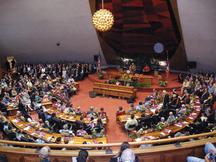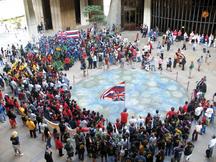A neighbor island view of the state Legislature
by Rob Parsons |
 |
 |
Where's the free food? .
January 24, 2008
Walking the 'Ledge' Each year, the opening of the state Legislature unfolds with crowds of people, optimistic speeches, big pomp and circumstance, enough flower leis to rival a graduation ceremony and food-lots of free food. It's a time-honored opportunity for a meet-and-greet with elected officials, who characteristically may be difficult to access during the rigorous four-month legislative session.
Neighbor island delegates to the state Senate and House of Representatives have long struggled to win a fair share of tax revenue allocations, given the large number of votes from Oahu legislators. Maui has a delegation of three in the state Senate-Roz Baker, Kalani English, and Shan Tsutsui-compared to 18 senators from Oahu. Similarly, Maui's delegation of six to the state House-Joe Bertram III, Mele Carroll, Angus McKelvey, Bob Nakasone, Joe Souki and Kyle Yamashita-are outnumbered by 35 members from Oahu.
It might have been deemed helpful for "home-rule," or self-government in local matters, when we elected Governor Linda Lingle, a former Molokai councilwoman and Maui County Mayor. But our expatriate governor has not heeded Maui's cries for home rule on issues such as expanded health care facilities, highway improvements and environmental review for the Hawai`i Superferry.
It's true that Maui's delegates to the Legislature hold some strategic positions. Rep. Souki, once the speaker of the House, now chairs the Transportation Committee. Sen. Baker chairs the Ways and Means Committee, guiding money appropriations that can make or break proposed legislation. Sen. English is chairman of the Transportation and International Affairs committee and sophomore Rep. Yamashita chairs the Economic Development and Business Concerns Committee.
Still, there is an established pecking order that limits the clout of those who have not spent as many years in the state capitol, unless they are willing to follow the political lead of senior members. And, as one representative once told me, much of the "nitty-gritty" business of the state Legislature takes place in barroom discussions at Honolulu's Restaurant Row.
So the opening of this year's legislative session once again provided a glimmer of hope in an otherwise muddled political process. Arriving at the State Capitol steps after an early morning flight, we walked up the Beretania Street steps, where the Father Damien statue greets visitors.
As a high school band warmed up in the open-air rotunda, hundreds of people gathered outside for the second day of protests and awareness of GMO testing on taro. Molokai's Walter Ritte was among many calling for a legislative hearing on the matter, and for a 10-year moratorium on testing.
 |
 |
 |
This anti-GMO Taro gathering
looks a bit more festive... .
Many in the large, colorful crowd held taro plants aloft, hoisted Hawaiian flags flown upside-down-a sign of distress-and displayed signs such as "No GMO" and "Save Haloa." On the south side of the capitol building, many more Native Hawaiians set up banners and a de facto occupation inside the gates of `Iolani Palace.
According to the Hawaiian origin chant, the Kumulipo, Haloa was the stillborn son of sky father Wakea, and Star Mother Ho`ohokukalani. Placed in the ground, he grew into kalo, or taro. The second born was man, whose kuleana, or responsibility was to take care of Haloa, his elder brother. Thus, Haloa, the kalo, became the staple food of the Hawaiian people.
Television news teams, reporters, and student video crews captured the myriad events, while dozens of onlookers viewed the spectacle from the hallway railings above the rotunda courtyard.
Meanwhile, staffers in the legislative offices on the second, third and fourth floors spread out elaborate feasts of Sterno-warmed lunch items, desserts, snacks and beverages. A steady flow of constituents sampled the fare, and met their elected officials, who were bedecked in coat and tie or finest dress and adorned with showy flower leis. Soon, the crowds shifted to Senate and House chambers for the opening festivities, before more feasting and greeting in the afternoon.
Of course, House and Senate leaders want to put on their best appearances of addressing key island-wide issues in opening orations. But this year's opening session contained some unexpectedly encouraging emphasis on topics like local renewable energy, enough to uplift even the most skeptical of political observers.
House Speaker Calvin Say brought the most attention to Hawai`i's over-dependence on imported petroleum, and the opportunities to bolster our local economy with renewable energy incentives. Calling for people to help leaders take charge of our own destiny, Rep. Say spoke of embracing change.
"We are thousands of miles away from the resources necessary to support the lives of more than a million people," Say said. "So we must significantly increase our efforts to achieve greater sustainability. To take care of our own destiny, we must recognize that good environmental policy and a sound economy should work together."
Typical political banter, some might believe-especially from one who helped usher in Act 2, exempting Hawai`i Superferry, Inc. from an environmental review that would have kept their boat in port until state officials could address all the ferry's impacts.
But Say continued. "So, let me begin with what I believe is our most pressing environmental and economic concern-total dependence on imported fuels-fuels that cost us more and more each day," he said. "The increase in their price shows up in the gas we buy, the electricity we use, and the food we eat. Last year at this time, the price of oil was just under $50 a barrel. Earlier this month that price had doubled. Hawai`i is not far away from a day when the cost of jet fuel will start to play havoc with our tourist-based economy. Some say it has already started to do that."
Not bad. And there's more:
"Hawai`i's unique environment presents us with an unparalleled opportunity to lead our nation in the development of renewable energies," he said. "I realize there are considerable challenges surrounding the increased production of sugar cane and other bio-fuel crops. Issues of water rights and infrastructure; issues that will require us to change our land use policies. But wouldn't most of us rather gaze at a sugar cane field that helps power our cars, than a field of high-rise condos built for the offshore rich?"
Say said Hawai`i should have solar and wind power on every island; hydropower on Kauai-the "wettest spot on Earth;" even wave energy, which he said lies "just over the horizon.
"In the end, achieving better energy efficiency and practicing conservation are the two most immediate ways we can decrease our dependence on outside resources," Say concluded. "If we could just produce half of Hawai`i's energy, we would add at least $2 billion to the state's economy. And the money stays here, not in a bank somewhere in Texas or the Middle East. This is how we will begin to take control of our own destiny."
This is the very message I flew to Honolulu to deliver to our legislators. I was greatly encouraged that common sense seemed to finally have trumped the strong suit of political pandering and old-boy politics, at least in this session's opening comments.
But now the work begins. Paid lobbyists work the office hallways daily, not just when there's free food laid out. Citizen lobbyists are wise to be as diligent as possible. It's helpful to set up a relationship with office aides and staff, who may be more accessible to communications. When our elected legislators hold "talk-story" sessions on Maui, we should attend and introduce our personal areas of concern for state funding support.
It's a cumbersome and flawed process, but it's the way the wheels of government turn; sometimes it even takes us down the road of a beneficial future. Embarking on policies for food sovereignty and statewide incentives for local, sustainable energy and fuel production are worthy goals for the 2008 state legislative session. It's a way we can literally return the "Power to the People."
You can track the Hawai`i state Legislature at http://www.capitol.-hawaii.gov.